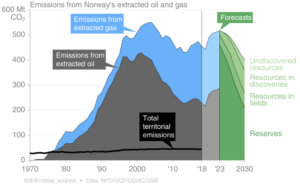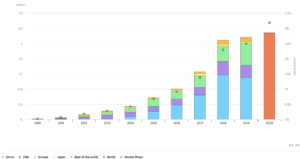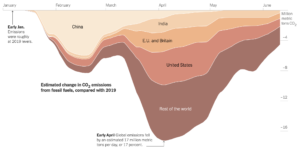FW: Korean Insurance Companies
wcrpaust@iinet.net.au
Tue, Aug 11, 10:34 AM (1 day ago)
to me
Dear Sejin
Is this a better letter to send to Korea Quakers and Religions for peace
If so I will send it in the next day or so
Best wishes
Sue
----
From: chair@arrcc.org.au <chair@arrcc.org.au>
Sent: Tuesday, 11 August 2020 10:24 AM
To: wcrpaust@iinet.net.au
Subject: FW: Korean Insurance Companies
Dear Sue
I’ve added some more information where you’ve requested it below, and incorporated your changes.
I’ve e-mailed MarketForces for helpful contacts in Korea and any info they might have in the Korean language.I’ll let you know when I hear back.
Warmest regards
Thea
------
Thank you for your kind offer of reaching out to Religions for Peace in Korea. I trust you will gauge their willingness to help, and I hope the background and links below will be useful for that.
Background
The Australian Religious Response to Climate Change (ARRCC, pronounced ark”) is a multi-faith organisation dedicated to galvanising diverse people of faith to respond to the climate crisis. We support changes that can be made at an individual and communal level, and we advocate for positive policy shifts in the corporate and government sectors.
ARRCC has been supporting resistance to Adani’s Carmichael Coal and Rail Project in central Queensland. At a time when humanity must urgently shift away from its dependency on coal, the Carmichael project and its associated coal port would produce enough coal over its lifetime to emit 4.6 billion tonnes of CO2 emissions, equivalent to over eight years of Australia’s national annual greenhouse gas emissions. Its rail line would also open up the greenfield Galilee Basin to further coal mines.
Adani’s project has already violated First Nations land rights; it threatens scarce water resources for farmers and the environment in a drought prone regions, risks a section of our already stressed Great Barrier Reef (known as one of the seven wonders of the world) with dredging for shipping and would, if fully developed, fuel runaway global warming. According to Bill McKibben, a Christian climate activists and co-founder of 350.org, by opening up a huge new coal basin, the Carmichael Project could reasonably be described as a "carbon bomb". Our reasons for becoming involved are outlined in more detail on our webpage here: https://www.arrcc.org.au/join_arrcc_in_stopping_the_carmichael_coal_mine
To see how our resistance is expressed in terms of our values and beliefs, see here: https://www.arrcc.org.au/catholic_theologians_religious_join_multi_faith_calls_on_adani
Most Australians do not support this disastrous coal mine, with thousands taking action time and time again to show that every company associated with Adani faces serious reputational risk. That’s why over 71 major companies have already ruled out working with Adani. ARRCC and others write to the CEO's, outreach to staff, encourage supporters to e-mail, post on social media, protest outside, protest inside. Our current campaign plans, along with useful links are here: https://www.arrcc.org.au/adani_contractors.
Connection with South Korea
The connection with your part of the world is that South Korean companies are known as lenders to Adani for their coal port at Abbot Point and/or they have not ruled out further loans to Adani. Just weeks ago Samsung ruled out further finance to Adani's Abbot Point Coal Port, and today (3 August) Hanwha Investment Securities has backed away from Adani's coal. See: https://www.marketforces.org.au/info/key-issues/abbot-point/
We are now asking the Industrial Bank of Korea (@SMART_IBK) and Korea Investments & Securities (@Korea.Investment.Securities) not to extend finance for Adani’s Abbot Point Port or any of Adani’s Carmichael infrastructure. I have created a basic template for yourselves in South Korea to edit as you wish: https://drive.google.com/file/d/1LfNDyiHOaWNc_Wcy6LmOUAVicHtuiiR3/view?usp=sharing
I am happy to respond to questions anytime. My contact details are below.
With warmest blessings
Thea Ormerod
President, Australian Religious Response to Climate Change
--
I acknowledge that I live on Biddegal land of the Darug nation. Always was, always will be Aboriginal Land.
“Now is not a time to continue looking the other way, indifferent to the signs that our planet is being plundered and violated by greed for profit.” Pope Francis, World Environment Day 2020
---
Subject: Ruling out further finance for the Adani Carmichael coal project including Abbot Point port
Dear
We are moved by our diverse faith traditions to write to you about the potential for your company to finance parts of Adani’s Carmichael Coal and Rail Project. Our organisation, ……………………. We are writing in support of the movement appealing to companies to rule out financing the Adani Abbot Point Terminal (AAPT) which is on the north-east coast of Australia, or any part of the project .
In the midst of a climate crisis, the project would produce enough coal over its lifetime to emit 4.6 billion tonnes of CO2 emissions, equivalent to over eight years of Australia’s national annual greenhouse gas emissions. Its rail line would also open up the greenfield Galilee Basin to further coal mines.
As people of faith, we are concerned about the current and worsening impacts on those who are most vulnerable, today’s younger generations, people living in areas more subject to cyclones, heat-waves, sea-level rise and drought. We are concerned about the spiritual rights of the Indigenous people of the Galilee Basin, the Wangan and Jagalingou, who continue to fight to defend their homelands from this project. We are concerned about the harm Adani has inflicted on the indigenous people of Godda, India, where the company is building its coal-fired power plant. Finally, we are concerned that Adani has such a track record of not paying debts, environmental vandalism and corruption but still manages to have its way in the business world.
All of us share in the moral responsibility to act, especially those of us who have positions of influence, whether the influence is economic or political. Your company has a responsibility to use it to do good for the benefit of the wider community and future generations.
We have only one earth, one common home. The climate crisis threatens the future of life as we know it. Please let us know that your company will not consider financing any part of Adani’s disastrous new Carmichael project.
Australians are opposed to the mine. A national opinion poll in January 2018 found 65% of respondents either opposed or strongly opposed the Carmichael mine. Any company associated with this climate-wrecking project faces massive reputational risks including being the target of the immense public opposition to Adani's Carmichael project. These are risks that are not worth taking.
We urge you to publicly rule out any finance for Adani’s Carmichael coal project, including the Abbot Point Port, other associated infrastructure and project contractors.
In total, 71 major companies in the banking, insurance, construction, haulage and engineering sectors have now ruled out support for Adani’s Carmichael Project.
We hope to hear soon that your company is not involved and will not be involved in the future. We would welcome the opportunity to discuss this matter further with you.
From: wcrpaust@iinet.net.au <wcrpaust@iinet.net.au>
Sent: Monday, 10 August 2020 5:06 PM
To: chair@arrcc.org.au
Cc: 'Robert Dawlings' <robert@arrcc.org.au>; 'WCRP' <wcrpaust@iinet.net.au>; 'Adrian & Elizabeth Glamorgan & PO'' <elizabethandadrian@gmail.com>
Subject: Korean Insurance Companies
Dear Thea
I have nearly linked enough with Quakers in Aust and RfPA Des for approval for this letter to be send to SK
I asked Robert to help me but I think it is better the question goes to you
Our South Korean (SK) Australian Quaker wondered if you could put a few more sentences in on what Adani is etc and the other parts as this would give more ccontext
Secondly he was wondering if you could send him some links to information on the topic via me
He has read Wikipedia and other stuff
He is a retired academic specialist in the Koreas and Japan
He said there is little if anything in the Korean language on the issue
He is a person who wants to know a lot before he makes his mind up to assist
I have suggested he might like to come on Friday to the Zoom party
My question (to Robert and is probably better coming directly to you) is does Market Forces have any contacts in South Korea so we could link SK Quakers and RfP SK with them.
If not that is fine. I will send these letters to letters myself and we will wait to see if my fellow Q will get involved or not
Best Wishes
Sue Ennis
---------------
……………………………………..
This is from Thea
Dear Sue
Thank you for your kind offer of reaching out to Religions for Peace in Korea. I trust you will gauge their willingness to help, and I hope the background and links below will be useful for that.
Background
The Australian Religious Response to Climate Change (ARRCC, pronounced ark”) is a multi-faith organisation dedicated to galvanising diverse people of faith to respond to the climate crisis. We support changes that can be made at an individual and communal level, and we advocate for positive policy shifts in the corporate and government sectors.
ARRCC has been supporting resistance to Adani's Carmichael Coal and Rail Project in central Queensland ( more one how big etc) Adani’s project has already violated First Nations (aboriginal added ) land rights; it threatens scarce water resources for farmers and the environment in a drought prone regions, risks our already stressed Great Barrier Reef (one of the seven natural wonders of the world??) with dredging for shipping and would, if fully developed, fuel runaway global warming. This toxic project could open up a huge new coal basin, a "carbon bomb" in Bill McKibben's terms out. Our reasons for becoming involved are outlined in more detail on our webpage here: https://www.arrcc.org.au/join_arrcc_in_stopping_the_carmichael_coal_mine
To see how our resistance is expressed in terms of our values and beliefs, see here: https://www.arrcc.org.au/catholic_theologians_religious_join_multi_faith_calls_on_adani
Most Australians do not support this disastrous coal mine, with thousands taking action time and time again to show that every company associated with Adani faces serious reputational risk. That’s why over 71 major companies have already ruled out working with Adani. ARRCC and others write to the CEO's, outreach to staff, encourage supporters to e-mail, post on social media, protest outside, protest inside. Our current campaign plans, along with useful links are here: https://www.arrcc.org.au/adani_contractors.
Connection with South Korea
The connection with your part of the world is that South Korean companies are known as lenders to Adani for their coal port at Abbot Point and/or they have not ruled out further loans to Adani. Just weeks ago Samsung ruled out further finance to Adani's Abbot Point Coal Port, and today (3 August) Hanwha Investment Securities has backed away from Adani's coal. See: https://www.marketforces.org.au/info/key-issues/abbot-point/
We are now asking the Industrial Bank of Korea (@SMART_IBK) and Korea Investments & Securities (@Korea.Investment.Securities) not to extend finance for Adani’s Abbot Point Port or any of Adani’s Carmichael infrastructure. I have created a basic template for yourselves in South Korea to edit as you wish: https://drive.google.com/file/d/1LfNDyiHOaWNc_Wcy6LmOUAVicHtuiiR3/view?usp=sharing
I am happy to respond to questions anytime. My contact details are below.
With warmest blessings
Thea Ormerod
President, Australian Religious Response to Climate Change
264 Pitt St
Sydney. NSW. 2000.
Ph: 02 9150 9713
M: 0405 293 466
E: chair@arrcc.org.au
W: www.arrcc.org.au
I acknowledge that I live on Biddegal land of the Darug nation. Always was, always will be Aboriginal Land.
“Now is not a time to continue looking the other way, indifferent to the signs that our planet is being plundered and violated by greed for profit.” Pope Francis, World Environment Day 2020
Subject: Ruling out further finance for the Adani Carmichael coal project including Abbot Point port
Dear
We are moved by our diverse faith traditions to write to you about the potential for your company to finance parts of Adani’s Carmichael Coal and Rail Project. Our organisation, ……………………. We are writing in support of the movement appealing to companies to rule out financing the Adani Abbot Point Terminal (AAPT) or any part of the project ( Added) which is in the north east of Australia
In the midst of a climate crisis, the project would produce enough coal over its lifetime to emit 4.6 billion tonnes of CO2 emissions, equivalent to over eight years of Australia’s national annual greenhouse gas emissions. Its rail line would also open up the greenfield Galilee Basin to further coal mines.
As people of faith, we are concerned about the current and worsening impacts on those who are most vulnerable, today’s younger generations, people living in areas more subject to cyclones, heat-waves, sea-level rise and drought. We are concerned about the spiritual rights of the Indigenous people of the Galilee Basin, the Wangan and Jagalingou, who continue to fight to defend their homelands from this project. We are concerned about the harm Adani has inflicted on the indigenous people of Godda, India, where the company is building its coal-fired power plant. Finally, we are concerned that Adani has such a track record of not paying debts, environmental vandalism and corruption but still manages to have its way in the business world.
All of us share in the moral responsibility to act, especially those of us who have positions of influence, whether the influence is economic or political. Your company has a responsibility to use it to do good for the benefit of the wider community and future generations.
We have only one earth, one common home. The climate crisis threatens the future of life as we know it. Please let us know that your company will not consider financing any part of Adani’s disastrous new Carmichael project.
Australians are opposed to the mine. A national opinion poll in January 2018 found 65% of respondents either opposed or strongly opposed the Carmichael mine. Any company associated with this climate-wrecking project faces massive reputational risks including being the target of the immense public opposition to Adani's Carmichael project. These are risks that are not worth taking.
We urge you to publicly rule out any finance for the Adani added Carmichael coal project, including the Abbot Point Port, other associated infrastructure and project contractors.
In total, 71 major companies in the banking, insurance, construction, haulage and engineering sectors have now ruled out support for Adani’s Carmichael Project.
We hope to hear soon that your company is not involved and will not be involved in the future. We would welcome the opportunity to discuss this matter further with you.
--------------






 Jim KABLE says:
Jim KABLE says:

1 Response to TIM BUCKLEY & PRAVEEN GUPTA. Energy is pivotal to India’s economic development and sustainability goals. Part 2 of 2.